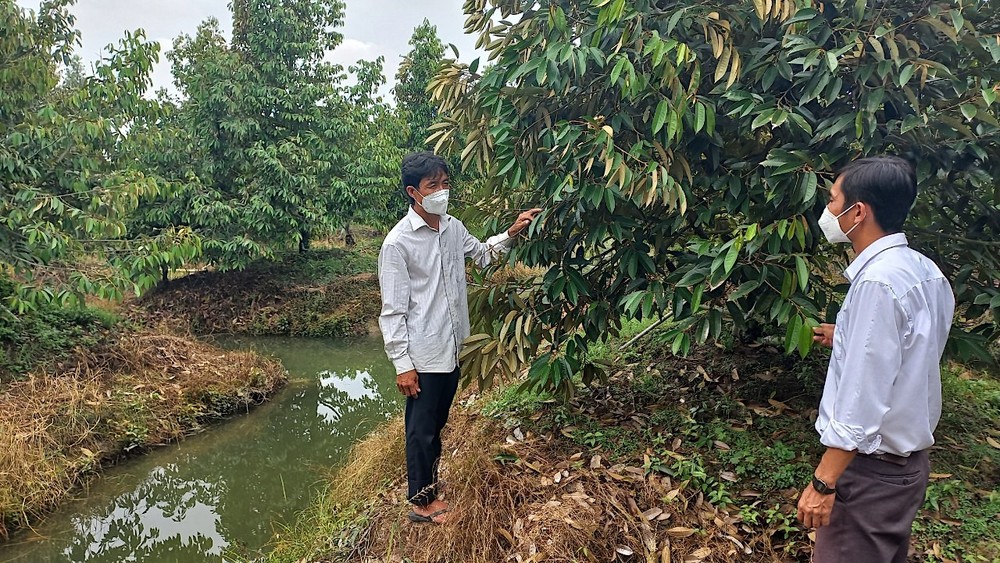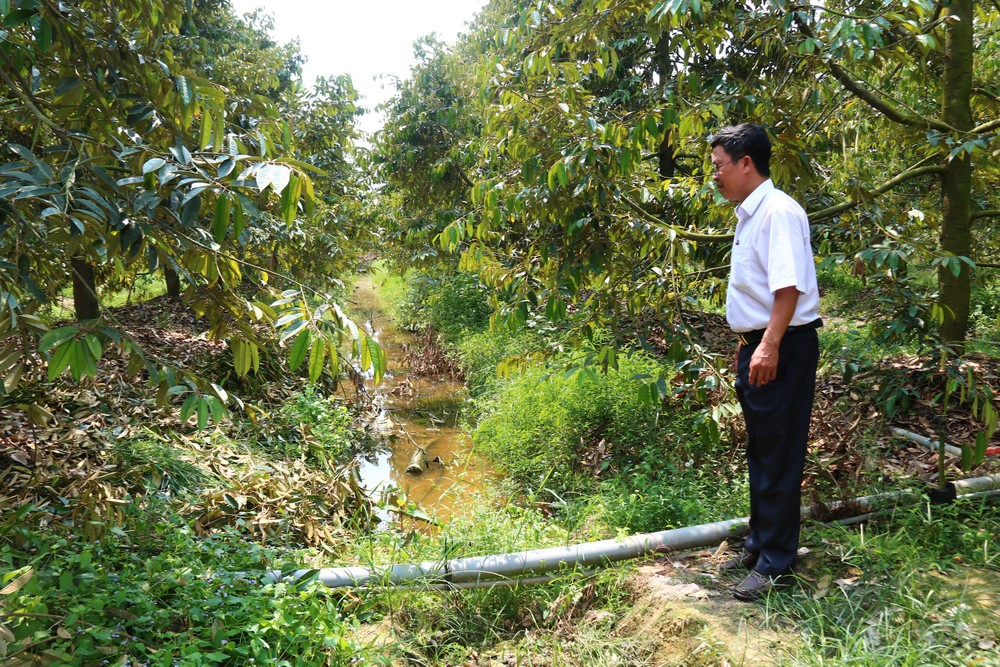
Tien Giang Province boasts the largest fruit tree cultivation area in the Mekong Delta, covering over 86,000 hectares. This year, this locality is grappling with the direct impact of drought and salinity on 35,000 hectares of fruit trees, with 22,000 hectares of durian in the riverbank communes facing the most severe risks.
Local authorities and residents in Tien Giang are swiftly implementing measures to combat saline intrusion, aiming to ensure the absolute safety of these invaluable "million-dollar fruit orchards".
Ngu Hiep Islet, located in Cai Lay District and situated amidst the Tien River, is the Tien Giang Province's oldest durian cultivation area, spanning nearly 1,500 hectares. However, 80 percent of these orchards have already been bearing fruit, rendering them highly vulnerable to saltwater intrusion and freshwater scarcity during the dry season.
To address these challenges, local farmers have taken proactive measures such as storing water in canals and orchards to mitigate the impacts of drought and salinity. They also conduct regular monitoring of salinity levels to regulate water pumping accordingly. Furthermore, they have invested in drilling deep wells to secure a stable water supply for irrigation.
Trinh Thanh Ha, owner of a durian orchard spanning over 5 hectares in Cai Lay, Tien Giang, shared that in recent years, his durian orchard had brought significant economic value, so his family took great care of it and monitored saltwater intrusion daily, even hourly, to preemptively address any potential impact on his trees.
Mr. Vo Van Men, Director of the Plant Production and Protection Sub-Department in Tien Giang Province, explained that in order to combat saltwater intrusion this year, especially in Eastern districts, the agricultural sector recommends residents adapt by reorganizing their cropping schedules.
In the Western districts, tens of thousands of hectares of fruit trees along the banks of the Tien River are expected to be affected by saltwater intrusion. However, this year, the authorities have completed the construction of six culverts along Provincial Road 864. Consequently, when saltwater intrusion happens, these culverts will be sealed, and water will be diverted from the Nguyen Van Tiep canal to facilitate irrigation. This measure is deemed highly safe and efficient.
The two communes of Tan Phong and Ngu Hiep islets alone lack a closed embankment system, so the provincial authorities of Tien Giang have arranged additional drilled wells as a precautionary measure.
Additionally, residents are urged to excavate ponds for water storage and dredge canals to enhance water retention. They should store water in containers or reservoirs and adopt water-efficient irrigation methods while reducing overall water usage. In areas with water scarcity for irrigation, residents should thin out fruit trees and prune branches to prevent tree damage. Crucially, farmers must measure the salinity levels before utilizing water for irrigation.
 Tien Giang provincial authorities advise residents to check water salinity before utilizing water for irrigation.
Tien Giang provincial authorities advise residents to check water salinity before utilizing water for irrigation.
Furthermore, the People's Committee of Tien Giang Province has just issued an urgent directive to implement measures for preventing saltwater intrusion across the province. Accordingly, Cai Lay Town, Cai Lay District, and Cai Be District need to implement plans for reinforcing embankments and sluice gates to enable water storage for irrigation. Additionally, arrangements are underway to operate 17 drilled wells to support efforts in combating saltwater intrusion.
Concurrently, efforts are being made to clear water hyacinths and obstacles to improve the flow of rivers and canals across the region. Public awareness campaigns are being conducted to encourage residents to take proactive measures in reinforcing embankments, sluice gates, and reservoirs for water storage while promoting water-saving irrigation practices. Additionally, the importance of testing water salinity levels before using it for irrigating fruit orchards is emphasized.
The Tien Giang Provincial People's Committee has directed the Tien Giang Water Supply Limited Company to intensify inspections and operations of water treatment plants and distribution stations, ensuring a continuous water supply without interruptions for residents. They also install and activate public water taps according to the plan to provide free water access for people in remote areas. Furthermore, they should proactively replenish water sources stored in ponds for residents and develop a plan to ensure consistent domestic water supply in Eastern regions throughout the 2024 dry season.
























